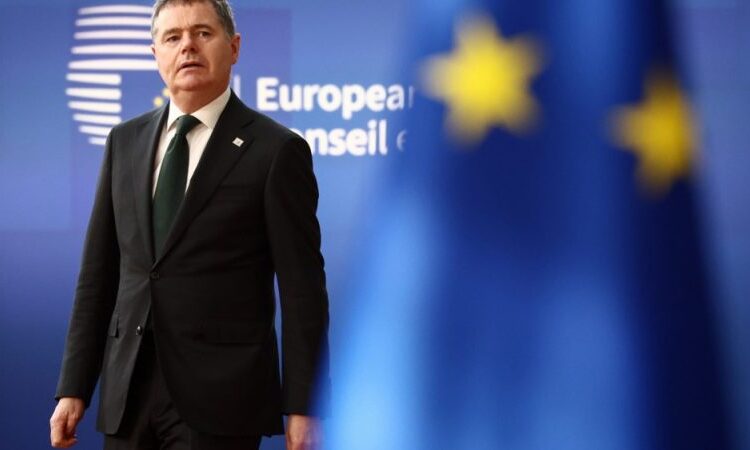NextGenEU vital to bloc’s future competitiveness, stresses Eurogroup chief Paschal Donohoe – Euractiv

The EU’s multibillion pandemic recovery fund is the key “piece in the jigsaw” of how to finance the bloc’s core economic objectives until private markets are sufficiently integrated, Eurogroup President Paschal Donohoe told Euractiv in an interview on Monday (13 May).
Speaking ahead of a meeting of eurozone finance ministers in Brussels, Donohoe said that the €806.9 billion Next Generation EU (NextGenEU) is key to boosting the bloc’s lagging competitiveness — as member states grapple with new EU fiscal rules.
He noted that the programme — currently meant to be wrapped up in 2026 — functions as “a way of bridging the timing gap” while negotiations to deepen the Capital Markets Union (CMU) — plans for which were first announced in 2015 — remain ongoing.
“[NextGenEU] for me, is the piece in the jigsaw that allows us to reconcile the need to normalise budget policy but give a higher priority to capital investment than we’ve done in the past,” Donohoe said.
“We need to acknowledge that the key issue will be one of timing regarding how we galvanise savings [via the CMU] in such a way that they’re capable of impacting our economic performance this decade,” he added.
“And that is why we can’t lose sight of the importance of Next Generation EU […] as a way of bridging the timing gap.”
Agreed at the height of the COVID-19 pandemic in July 2020, NextGenEU offers member states financing to make critical green, digital, and other investments in exchange for targeted reforms. It is the first-ever EU scheme to be funded through debt jointly underwritten by member states.
While EU Commissioner for the Economy Paolo Gentiloni officially called for turning it into “a blueprint” for permanent joint borrowing in April, the scheme’s renewal is currently heavily resisted by conservative political groups as well as ‘frugal’ member states — including Germany, the bloc’s largest economy.
Donohoe admitted that there currently “isn’t a consensus” among finance ministers on the need to renew NextGenEU.
However, he suggested that future analyses will have a “very positive story to tell” about the initiative’s overall impact.
“The question of whether there should be a similar economic instrument in the future is part of the discussion that we need to complete, and I’m optimistic that we’ll be able to do that,” he said.
Changed understanding of fiscal rules’ impact
Donohoe also responded to criticism that the implementation of the bloc’s new fiscal rules — which entered into force last month — may squeeze member states’ ability to make critical public investments.
In particular, he said that the Eurogroup’s announcement in March this year that the rules will “translate into an overall slightly contractionary fiscal stance” in 2025 should be understood “in terms of what went before.”
“What we had talked about previously [was] the need for a contractionary stance” in 2023 and 2024, Donohoe said in reference to the January Council conclusion.
“I would actually argue that in calling for a ‘mildly contractionary’ stance for next year, as opposed to a ‘contractionary stance’, we’re trying to get the balance right,” he said.
The euro-area financial chief argued that the more nuanced language for the bloc’s budget needs in 2025 is also linked to the group’s “recognising that there are investment needs that only the public sector and the European Union are best placed to fund,” he said.
Growth needs to be the EU’s key political focus for the next decade
Donohoe’s comments come amid growing concern about the state of the eurozone economy, as high energy prices, slowing global demand, lagging productivity growth and record-high interest rates hamper the bloc’s growth rate.
He stressed that the EU’s “great challenge” going forward will be to focus attention specifically on growth.
“I think for so long now, our attention, by virtue of necessity, has been elsewhere,” Donohoe said as the bloc has been dealing with the COVID-19 pandemic and the war in Ukraine.
“What I believe is the great challenge […] for the European Union is to ensure that the issue” of how Europe grows and the speed at which it grows “receives the political focus that it needs in the decade ahead,” he said.
“Because if we can’t address that, so many of the other challenges that we have are going to get a lot harder,” he added.
[Edited by Rajnish Singh]







